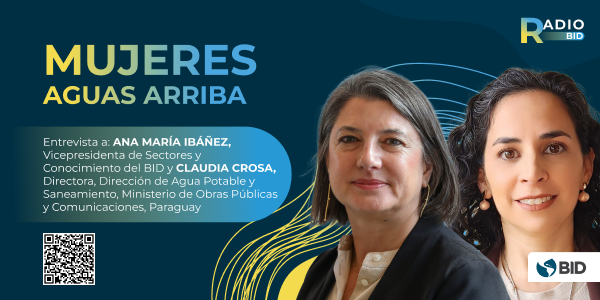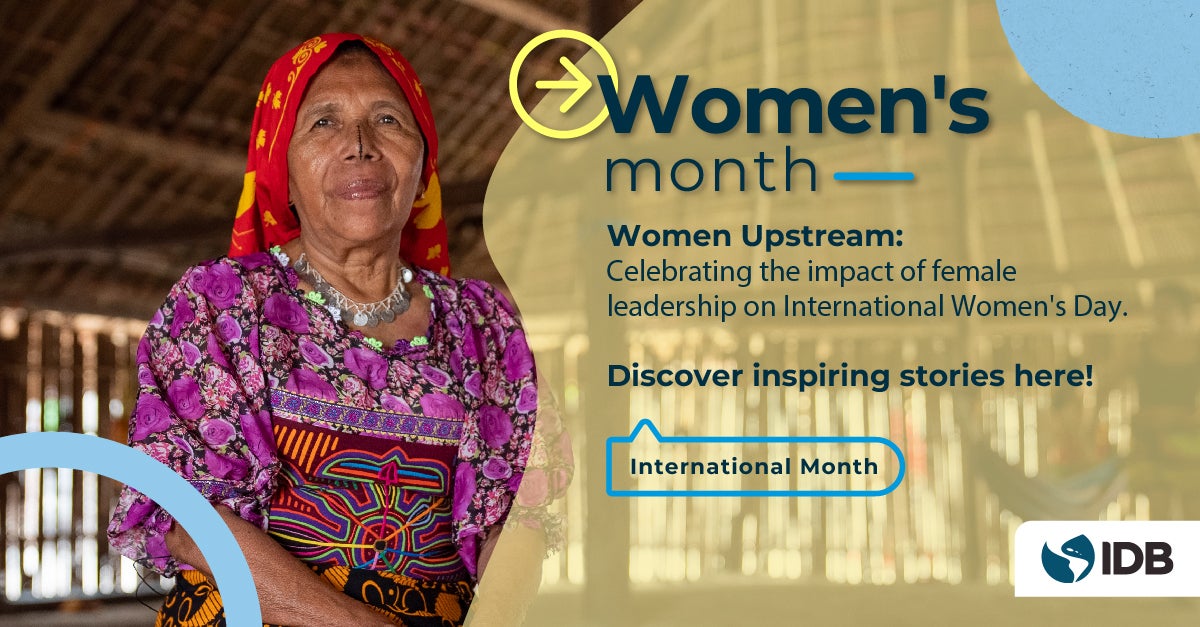Written by Andrea Ortega
In a world where access to water remains a challenge for 17 million people and where 72 million people still lack access to sanitation, according to WashData; women emerge as central figures in the fight for equity and sustainable development in this sector in Latin America and the Caribbean.
Women play a leading role in access to water and sanitation, in addition to having differentiated needs and enormous potential to contribute to these projects. “All projects we undertake in the region must take into account the differentiated impact of development challenges for women and men,” said Ana María Ibáñez, Vice President of Sectors at the Inter-American Development Bank (IDB), in the Mujeres Aguas Arriba podcast (Available on Soundcloud). For this reason, the “Women Upstream” initiative, a collaboration between the Inter-American Development Bank (IDB) and the Spanish Agency for International Development Cooperation (AECID in Spanish), seeks to make visible the crucial role that women play in the water and sanitation sector through new formats such as their book of stories, their audiobook, and this recent podcast.
Women Upstream was launched in commemoration of International Women’s Day, with a series of profiles of notable women leading initiatives related to water and sanitation throughout the region. Through their testimonies and experiences, this program highlights how these female leaders challenge gender stereotypes, overcome socio-economic barriers, and contribute to the sustainable development of their communities. Here are some of the profiles you can find on our blog and in our new book of stories and audiobook:
Profiling Female Resilience
Some of these women show resilience in highly masculinized environments, where they have managed to lead teams and improve conditions for all workers, such as Laura Guanoluisa and Cristina Arango.
Laura Guanoluisa, president of the National Recycling Network of Ecuador, bravely leads the fight for the rights of recycling workers while balancing her personal and professional life. Her story highlights the importance of gender inclusion in all aspects of development. Read her story and watch her video here.
And Cristina Arango, former director general of a water and sanitation company in Bogotá, Colombia, shares her experience in a traditionally male-dominated field. Her dedication to including more women in this sector demonstrates the transformative potential of equitable leadership. You can read and watch her testimony here.
“These examples highlight the need to change perceptions and cultural norms that limit women’s full participation in certain labor sectors […] It is essential to address these obstacles to ensure a more equal and just future for all people,” explains Claudia Crosa, director of the drinking water and sanitation department of the ministry of public works and communications of Paraguay in our podcast.

Leadership and Community Commitment
Other women in the water and sanitation sector lead with a community imprint, such as Sara López and Gabriela Castillo.
Sara López, a Paraguayan engineer, is an example of this. She stands out for her tireless defense of a community model of water and sanitation. As a pioneer in a predominantly male environment, Sara advocates for active participation of women in decision-making related to water, demonstrating that female leadership is essential for the success of development projects. Here‘s her story in blog and video.
Meanwhile, Graciela Castillo, a Honduran volunteer, plays a crucial role in educating and raising awareness in her community about water and sanitation projects. Her dedication reflects the commitment of rural women to promoting equitable access to water resources. Here you can see and read her testimony.
Breaking Barriers and Creating Opportunities
Within the series, there are also women who have taken on the task of breaking glass ceilings in water and sanitation and even opening opportunities for more women to join the sector.
Thus, Nancy González, a migrant woman in Argentina, challenges gender stereotypes by seeking opportunities in the construction industry. Her determination to become a heavy machinery operator is a testimony to female empowerment and the struggle for equality of job opportunities. Here you can see her testimony in blog and video.
On the other hand, Adriana Acuña, a Costa Rican businesswoman, leads the way in overseeing water and sanitation projects in her community. Her commitment to including more women in Water Boards reflects the importance of female representation at all levels of decision-making. Learn from her story here.
Uniting Tradition and Development
But women are also the distinguished ones in preserving and passing on the culture of communities. That’s why Sonia Henríquez, an indigenous leader in Panama, stands out for her ability to merge indigenous worldview with development projects in her community. Her leadership exemplifies the importance of respecting and valuing cultural perspectives in the implementation of water and sanitation initiatives. Look and read here her story.
Celebrating Resilience and Diversity
“All these stories show the power of women and that we don’t really have barriers, that barriers are more in people’s imagination and in the culture we have. But really, women shouldn’t have any barriers to achieve what we want to do and to contribute to societies so that we are all better,” explains Ana María Ibáñez, Vice President of the IDB.
On International Women’s Day, “Women Upstream” reminds us of the importance of recognizing and celebrating the fundamental role that women play in water and sanitation management. This series highlights the transformative impact of female leadership in building equitable and sustainable communities in Latin America and the Caribbean. Additionally, it strengthens the commitment of the IDB and AECID to integrating gender approaches into development. Discover these stories of empowerment and solidarity in storybook, audiobook, and podcast format at these links.
The IDB together with the AECID have the common objective of providing quality water and sanitation services in rural areas of the region. Learn more about the projects carried out so far with the Cooperation Fund for Water and Sanitation (FCAS) in this publication.
To learn more about “Women Upstream” subscribe to our blog here.
Upstream Women’s Team:
Coordination: Anamaría Núñez, María Augusta Olmedo and Leticia Ortega
IDB Gender Specialists: Naiara Martínez
Content: Andrea Ortega Carreño and Paul Constance
Illustration: Verónica Alvarado and Carolina Curbelo
Audiovisual Production: Adriana Loeff


Leave a Reply